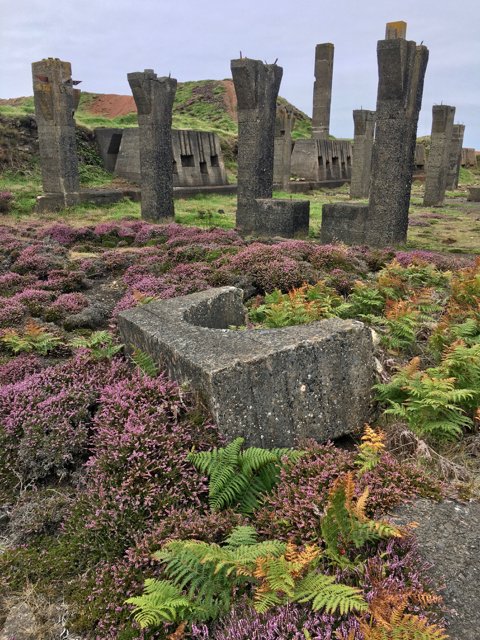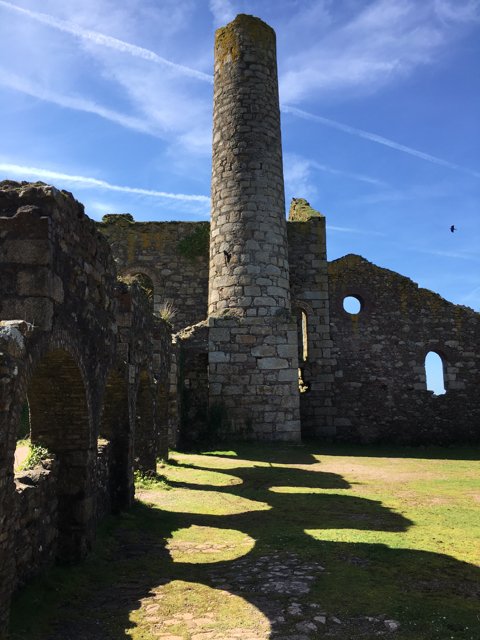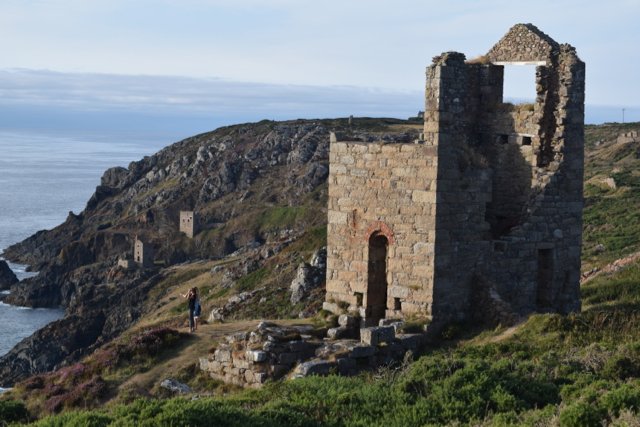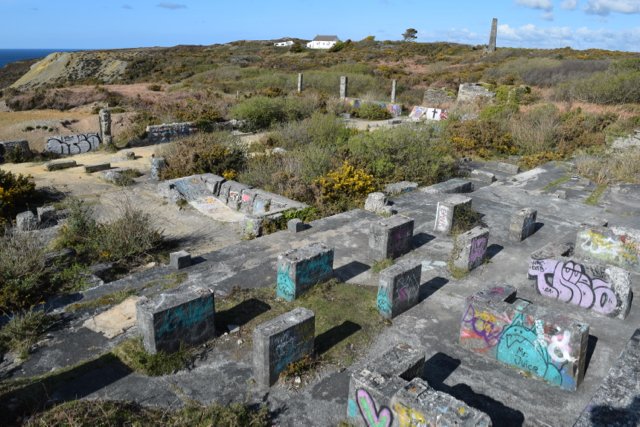Abandoned Cornwall: my top twenty-five
I often feel that almost all of Cornwall is abandoned, especially its people, but I’ve restricted this list to things, buildings and places (most of which I’ve posted about before). Its engine houses are everywhere and it’s hard to list specific ones (I love them all!), so I’ve mainly chosen districts of them, which tend to be most impressive. Forget your boring beaches; for me, this is the ultimate guide to Cornwall.
More topically, many Cornish towns are now abandoned ghost towns for over half the year, due to the proliferation of holiday cottages and Airbnb (even I have used Airbnb a couple of times but never understood the name: there’s never an air bed and I’ve never been served breakfast) in the county. We visited Polruan last year, which the Guardian recently reported that 52% of its properties were second homes or holiday lets. When we walked through the village, I was amazed at the lack of cars. When we were talking to a local I said it’s great you’ve banned cars from the centre (I’d recently been guilty of thumping the bonnet of a stuck car attempting to drive into the tiny, winding roads in the village of Polperro, a little further along the coast from Polruan). She looked at me like I was an idiot. It wasn’t tourist season; in a few weeks you wouldn’t be able to move for cars and tourists, she told us.
• My project Welcome to St. Decay covered many of the same abandoned buildings using infrared photography.
1. The Basset Mines
A large and important complex of mines on the Great Flat Lode near Redruth which previously consisted of South Wheal Frances, West Wheal Basset and Wheal Basset before they were amalgamated. The engine houses here are like cathedrals and abbeys. They were my first introduction to the wonderful world of Cornish mines.
2. Kennell Vale Nature Reserve, Ponsanooth
Still one of my favourite places in Cornwall.
3. Abandoned plane graveyard at Predannack Airfield, The Lizard
One of the most eerie and surreal sights in Cornwall, a graveyard of abandoned planes and helicopters not far from the beautiful Kynance Cove.
4. St Just Mining District
Crowns Engine Houses at Botallack Mine
Kenidjack valley
A dramatic coastal area – also known as the Tin Coast – that encompasses many iconic engine houses including Botallack, Carn Galver mine, Carn Prauner stamps (the Arsenic mine on the stunningly beautiful Kenidjack valley that leads down to Cape Cornwall), Ding Dong mine, Geevor mine, Levant mine, West Wheal Owles and Wheal Edward mines.
The China Clay district of Cornwall is possibly my favourite part of the county, a mysterious, beautiful and artificial world of azure-blue lakes and snow white pyramids. Some companies are still producing China Clay in the area but many of the pools and pyramids are long abandoned (and not so white any more, being overgrown with vegetation – but even that looks artificial for some reason). As with the engine houses, it’s impossible to pick out specific favourite areas as they’re all fabulous.
6. Roche Rock
Ruined 15th century hermitage near St. Austell.
An unusual example of a China clay works on Bodmin Moor, this one still has the feel of the ‘Cornish Alps’ that the area around St Austell used to be known as (most of the tips now have vegetation on them).
8. Huts/cottages/houses
Abandoned hut covered in ivy, Godrevy
Bodmin Moor
There are many of these ruins – old miner’s cottages or farm houses, shepherd’s huts – scattered around the county, usually somewhere impractical and inaccessible, with no running water or electricity, presumably why they’re not all being hired out as ‘authentic miner’s cottages’ for £250 a night (yet).
9. Poldice Valley and Wheal Maid
Mine workings at Poldice Valley
Part of the Gwennap Mining District, these two areas can be explored in a few hours, and there’s an ace cafe at Twelveheads. Despite being a harsh and mine-scarred environment I love this fascinating part of Cornwall, with mine workings in the Poldice valley and the amazing colours in the toxic waters of the Wheal Maid tailings lagoons.
10. St Agnes Mining District
The iconic Towanroath engine house at Wheal Coates; one of the most photographed mines in Cornwall.
Cligga Head
Another dramatic coastal area, this takes in the iconic Wheal Coates, the decimated landscape around Cligga Head and Wheal Kitty. There’s also a partially abandoned World War II airfield at Perranporth with underground bunkers and pill boxes.
11. Tregargus Woods, St Stephens
A beautiful, tranquil wood with a river running through it and plenty of mine remains.
12. Caravans
Elsewhere in the UK, gardens might have sculptures, water features or flower beds; in Cornwall an abandoned, rusty caravan, not used for decades, is the de rigueur equivalent.
13. Luxulyan Valley
Beautiful wooded valley with mine workings near St. Austell.
14. Tivoli Gardens, Lerryn
Inspired by a visit to the Tivoli Gardens in Copenhagen, this smaller scale, concrete and granite amusement park in a Cornish woods was built by China Clay magnate Frank Parkyn over 100 years ago.
15. St Piran’s Oratory, Perranporth
A flooded chapel in the desert? Must be some kind of miracle.
16. St Cohan’s church, Merther
Commonly referred to as Merther church, this ruin, with one side completely covered with ivy, has been abandoned for over 100 years and dates from the 14th century.
17. Wheal Trewavas, near Rinsey
Less well known than Botallack but just as dramatic, maybe even more so with several terrifying open mine shafts going straight down to the sea.
18. Phone boxes
There are probably more in cities to be fair, but still a fair few in Kernow. Some have been converted into community bookshops.
19. Roger’s Folly, West Penwith
This Grade-II listed miniature castle was named after the architect John Rogers who built it in 1798 as a picnic destination.
20. The Huer’s Hut, Newquay
A lovely little building to make a hue and cry about.
21. National Explosives Factory, Hayle
Built to provide dynamite for the mining industry, the remains are dotted throughout the sand dunes of Upton Towans near Hayle.
22. Umbrellas
Though it has rained almost constantly for the last six months in Cornwall, it’s rare to see an umbrella in use because the also-constant wind turns them inside out and the rain is horizontal anyway.
23. The Fuse Factory, Tuckingmill
The former site of William Bickford’s safety fuse, this whole area is now being converted into houses, as predicted by me some years ago (though sadly lacking my vision). When I walked around it, whole rooms were littered with white shampoo bottles and yellow legal pads. Go figure.
24. Cars
Some of the abandoned things on this list here aren’t necessarily endemic to Cornwall but for some reason I notice them here more than anywhere else.
25. Shopping Trolleys
Another classic not restricted to Cornwall but you’ll find them here in many waterways and beauty spots.
Is this my final word on abandoned Cornwall? Extremely unlikely, there are many more mines to explore, shipwrecks to find and ruins to uncover.
Previously on Barnflakes
25 cool things to do in Pool, Cornwall
Welcome to St. Decay
Reviving Redruth (and environs)
Flickagrams #23, #30 and #31
Meeting Ross Poldark
Mine over matter
Celebrating Cornwall’s mining heritage










































